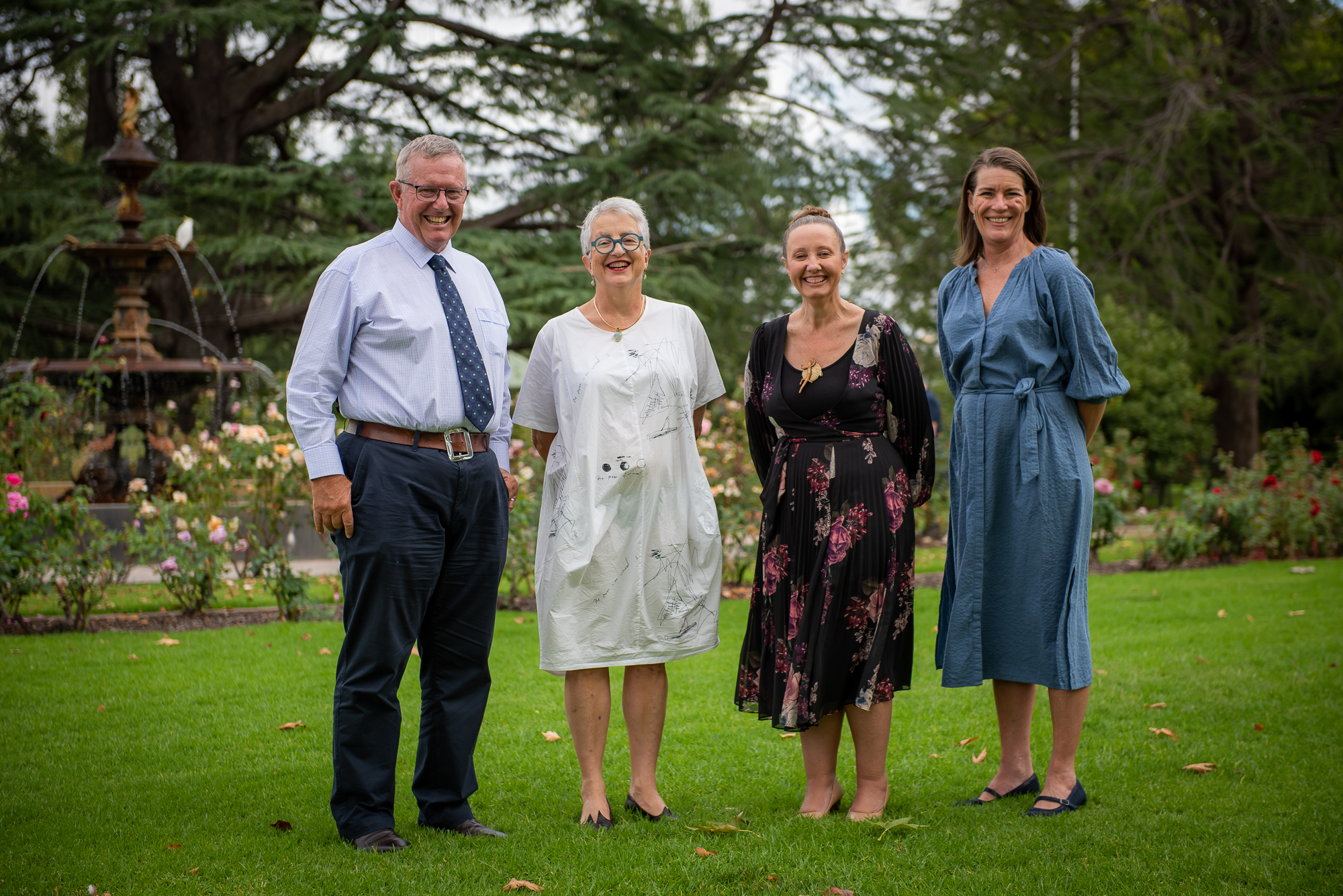Faye McMillan appointed Deputy National Rural Health Commissioner
Congratulations to Associate Professor Faye McMillan on her appointment as the first Deputy National Rural Health Commissioner
Congratulations to Associate Professor Faye McMillan on her appointment as the first Deputy National Rural Health Commissioner

Image: (L-R) The Hon Mark Coulton, Minister for Regional Health, Regional Communications and Local Government, Professor Ruth Stewart - Rural Health Commissioner, A/Prof Faye McMillan – Deputy Rural Health Commissioner, Senator Perrin Davey - Senator for New South Wales.
Associate Professor Faye McMillan is one of two Deputy Commissioners who will play a key role in the Federal Government’s agenda to increase access to rural health services and address rural workforce shortages.
“It is vital that current and future rural health professionals are acknowledged for their significant contribution in the delivery of health services to our remote, rural and regional areas across this nation,” says Associate Professor Faye McMillan from UNSW School of Population Health.
Associate Professor McMillan recently joined the UNSW School of Population Health as Associate Professor in Aboriginal and Torres Strait Islander Health and has had an extensive career in allied health in regional and rural NSW.
“I am looking forward to my role as Deputy Commissioner and with the School to grow partnerships and learning opportunities that can ensure all Australians – no matter where they live – have access to the healthcare they need and a choice in their own health and wellbeing,” says Faye.
Professor Rebecca Ivers, Head of the UNSW School of Population Health says: “I’m delighted to welcome Associate Professor Faye McMillan as an academic to the School and pleased her expertise has been further recognized by her appointment as Deputy National Rural Health Commissioner.”
People living in rural and remote Australia face unique challenges due to their geographic isolation and often have poorer health outcomes compared with those living in metropolitan areas.
According to Faye, despite allied health professionals being the largest group of the health workforce in Australia, they remain an under-utilised yet important health system resource.
“A person’s health and wellbeing should not be dictated by their postcode or by politics,” she says. “The allied health workforce can be leveraged to deliver tailored services to where people live, demonstrating that all communities are equal and valued in Australian society.”
Reflecting on her own career path as a community pharmacist, it was the ‘hub’ of community activity that surrounded her local pharmacy in her hometown, Trangie, NSW, that inspired her career choice.
“People didn’t need to be sick or to be dropping in a script to come into the pharmacy and there was a lot of opportunity to talk to them, be part of their lives, and to connect,” says Faye.
“We need more of this - as individuals, health professionals and a society - of looking at the ‘whole’ person, their community, their story to understand our role in their overall health and wellbeing,” says Faye.
“This means not shying away from tough conversations, confronting the hard truths of our nation and stopping to create a version of the present that is palatable and palpable – only then can we work together, to move forward and flourish,” she says.
Looking to the future, Faye is hopeful about the change that is possible globally but says we need to dig deep to get there.
“We need to work on the moral health of our society – the growing divide between ‘have’ and ‘have not’ is real. Many people are still living without their basic physical, mental and emotional needs being met, like access to clean water and food security, while others have much more than they will ever need,” says Faye.
“This is much more complex than throwing money at the problem - as a human race, we have to ask ourselves, why does this still exist and what is the circuit breaker?” she says.
“COVID-19 has shown us the possibilities of humankind – governments, businesses, communities – working together to protect each other – we now need to extend this to overcome health inequities.”
Faye, a busy working mum of two teenage boys and carer of her mum who has chronic and complex health needs, and says she also hopes individuals and society will embrace more the important role of women, mothers, grandmothers, sisters, aunts and the role of families in nurturing the next generation.
About Associate Professor Faye McMillan:
Faye is a Wiradjuri yinaa (woman) originally from Trangie, NSW. She joins the School from Charles Sturt University, where she was Director of the Djirruwang Program - Bachelor of Health Science (Mental Health).
Faye has received numerous accolades for her leadership and contribution to population health, education, equity and the community. In 2019 she was named as the NSW Aboriginal Woman of the year; in 2017 she was recognised in the Who's Who of Australian Women; and in 2014 she was included in the Australian Financial Review and Westpac 100 women of influence.
Faye holds a Doctor of Health Science, Master of Indigenous Health Bachelor of Pharmacy, Graduate Certificate Wiradjuri Language, Culture and Heritage, Graduate Certificate Indigenous Governance, and Graduate Certificate in Education. She is a Senior Atlantic Fellow for Social Equity and founding member of Indigenous Allied Health Australia (IAHA) and was a board member of IAHA from 2009-2017 (and chairperson from 2010-2016). Faye is the first registered Aboriginal Pharmacist.
See the Department of Health media release here.